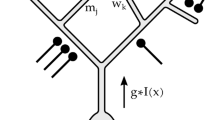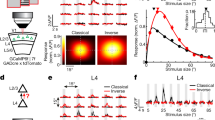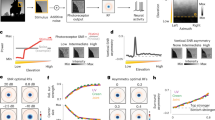Abstract
Hubel and Wiesel1,2 have described the responses of cells in the cat's visual cortex to precise stimulation of the retina. They say: “A comparison of visual responses in the anæsthetized animal with those in the unansesthetized unrestrained preparation1 shows that the main differences lie in the frequency and firing patterns of maintained activity and in the vigour of responses, rather than in basic receptive field organization.” They found that responses declined in vigour with anæsthesia.
This is a preview of subscription content, access via your institution
Access options
Subscribe to this journal
Receive 51 print issues and online access
$199.00 per year
only $3.90 per issue
Buy this article
- Purchase on Springer Link
- Instant access to full article PDF
Prices may be subject to local taxes which are calculated during checkout
Similar content being viewed by others
References
Hubel, D. H., J. Physiol., 147, 226 (1959).
Hubel, D. H., and Wiesel, T. N., J. Physiol, 160, 106 (1962).
Bremer, F., C.R. Soc. Biol., 118, 1235 (1935).
Burns, B. D., Heron, W., and Pritchard, R. W., J. Neurophysiol., 25, 165 (1962).
Smith, G. K., and Smith, D. R., Nature, 202, 253 (1964).
Author information
Authors and Affiliations
Rights and permissions
About this article
Cite this article
ROBERTSON, A. Anæsthesia and Receptive Fields. Nature 205, 80 (1965). https://doi.org/10.1038/205080a0
Published:
Issue Date:
DOI: https://doi.org/10.1038/205080a0
This article is cited by
-
Effect of Nembutal narcosis on dynamics of orientation tuning of cat visual cortex neurons
Neurophysiology (1994)
-
Directional tuning of visual cortex neurons in the cat before and after nembutal injection
Neurophysiology (1992)
-
Backward conditioned connection and inhibitory reorganization of the receptive fields of cortical neurons as the basis of subconscious change in the thresholds of visual recognition and detection
Neuroscience and Behavioral Physiology (1991)
-
Effects of sombrevine on orientational tuning of visual cortex neurons in the cat
Neurophysiology (1990)
-
Investigation of detector properties of neurons in the visual system of the rabbit
Neurophysiology (1973)
Comments
By submitting a comment you agree to abide by our Terms and Community Guidelines. If you find something abusive or that does not comply with our terms or guidelines please flag it as inappropriate.



